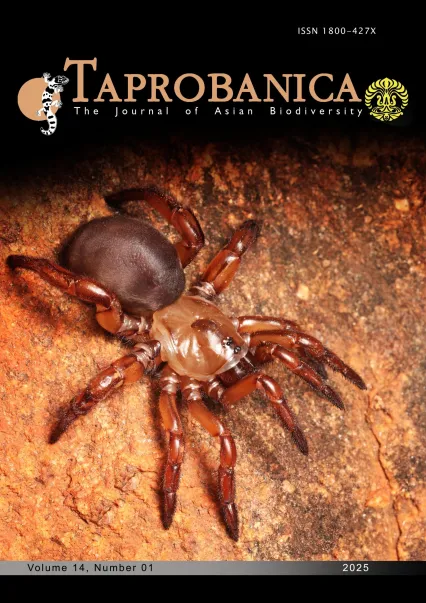

v14i1.349
Volume 14 | Number 1 | May 2025
Major Article
eISSN: 1800-427X (online)
DOI:10.47605/tapro.v14i1.349
Submitted date: 10 January 2025
Accepted date: 25 March 2025
Published date: 25 April 2025
Pp. 25–38.
A NEW BLIND SKINK (REPTILIA: DIBAMIDAE: Dibamus) FROM BUTON ISLAND, INDONESIA
M. Dwi Prasetyo, D. Satria Yudha, A.A. Thasun Amarasinghe, Ivan Ineich, G.R. Gillespie & Awal Riyanto*
*Corresponding author. E-mail: awal.riyanto@gmail.com
Abstract
Blind skinks of the genus Dibamus are one of the least studied squamate taxa, only represented by a limited number of museum specimens. Here we study the taxonomy of Dibamus novaeguineae sensu lato in Indonesia by examining all the available museum specimens collected from Wallacea and mainland West Papua deposited at the Museum Zoologicum Bogorienese (MZB) and evaluate morphological and biogeographic evidence. We also include all published data on specimens that were attributed to that species. Dibamus novaeguineae is widely distributed throughout mainland Papua, Maluku, Sulawesi, and adjacent islands, the Lesser Sunda Islands, and the Philippines. We compare D. novaeguineae sensu stricto on Papua and sensu lato populations on the Lesser Sunda Islands and demonstrate that the D. cf. novaeguineae population on Buton Island represents a distinct endemic phenotype. Based on morphological and scalation differences, we here describe this isolated population on Buton, an island off the coast of southeastern Sulawesi, as a new species. We further discuss the biogeography of that new species.
Key words : Dibamus novaeguineae, Lesser Sunda, Moluccas, Morphology, Sulawesi, Taxonomy
Section Editor: Nikolay A. Poyarkov
LSID:urn:lsid:zoobank.org
DOI:10.47605/tapro.v14i1.349
Submitted date: 10 January 2025
Accepted date: 25 March 2025
Published date: 25 April 2025
Pp. 25–38.
A NEW BLIND SKINK (REPTILIA: DIBAMIDAE: Dibamus) FROM BUTON ISLAND, INDONESIA
M. Dwi Prasetyo, D. Satria Yudha, A.A. Thasun Amarasinghe, Ivan Ineich, G.R. Gillespie & Awal Riyanto*
*Corresponding author. E-mail: awal.riyanto@gmail.com
Abstract
Blind skinks of the genus Dibamus are one of the least studied squamate taxa, only represented by a limited number of museum specimens. Here we study the taxonomy of Dibamus novaeguineae sensu lato in Indonesia by examining all the available museum specimens collected from Wallacea and mainland West Papua deposited at the Museum Zoologicum Bogorienese (MZB) and evaluate morphological and biogeographic evidence. We also include all published data on specimens that were attributed to that species. Dibamus novaeguineae is widely distributed throughout mainland Papua, Maluku, Sulawesi, and adjacent islands, the Lesser Sunda Islands, and the Philippines. We compare D. novaeguineae sensu stricto on Papua and sensu lato populations on the Lesser Sunda Islands and demonstrate that the D. cf. novaeguineae population on Buton Island represents a distinct endemic phenotype. Based on morphological and scalation differences, we here describe this isolated population on Buton, an island off the coast of southeastern Sulawesi, as a new species. We further discuss the biogeography of that new species.
Key words : Dibamus novaeguineae, Lesser Sunda, Moluccas, Morphology, Sulawesi, Taxonomy
Section Editor: Nikolay A. Poyarkov
LSID:urn:lsid:zoobank.org
- List of Articles & Contents





